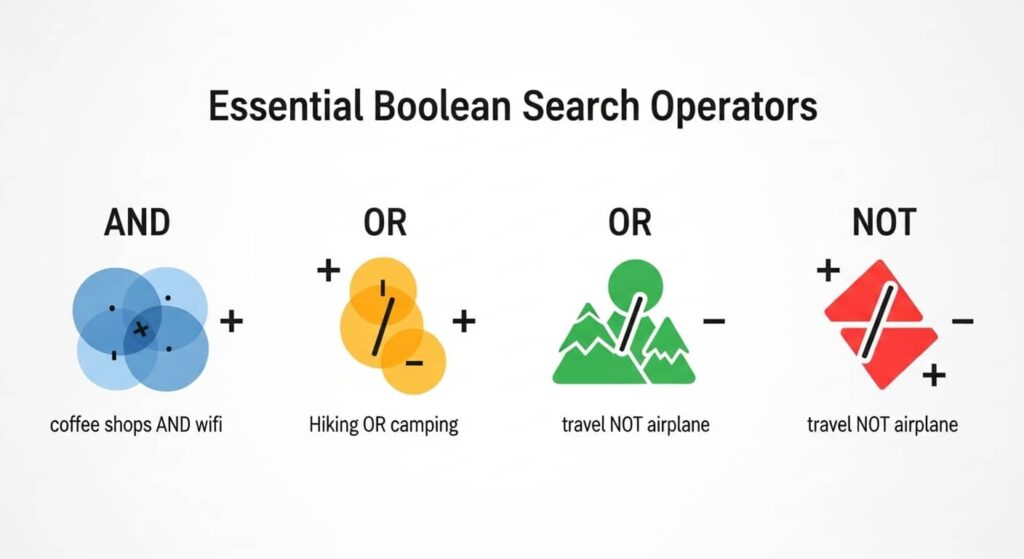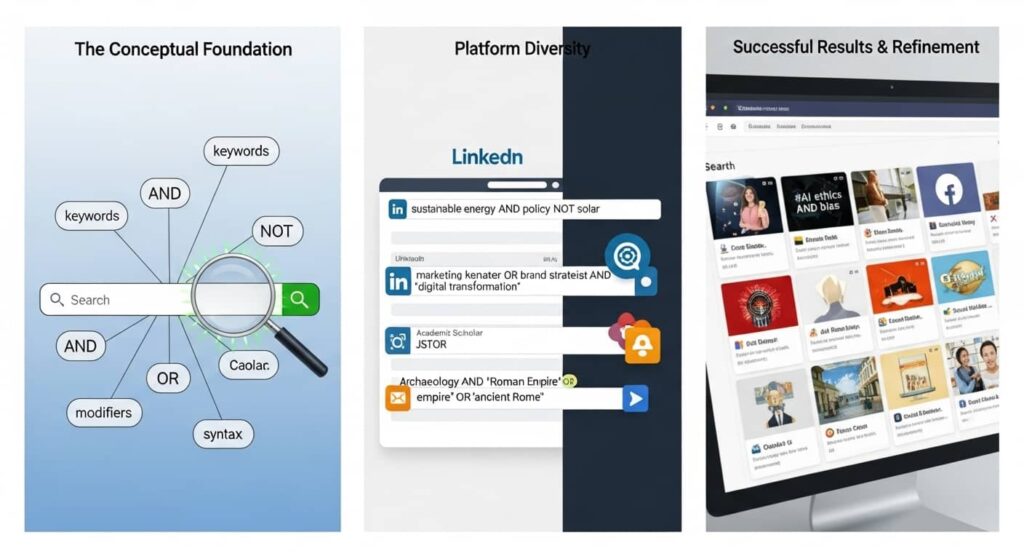Table of contents:
What is Boolean Search in Recruitment? Understanding Boolean Search in Modern Recruitment Essential Boolean Search Operators
The AND Operator: Narrowing Your Focus
The OR Operator: Expanding Possibilities
Quotation Marks: Exact Phrase Matching
Essential Boolean Operators Reference
Boolean Search Engine Optimization
Advanced Operator Combinations
Best Practices for Boolean Search Strings
Boolean Search Strings for Technical Roles
Boolean Sourcing Integration
Measurement and Optimization
Common Candidate Search Patterns
Platform-Specific Considerations
Technology Sector Example
Sales and Marketing Examples
Wildcard and Proximity Searches
Field-Specific Boolean Applications
ATS Integration Strategies
Technology Stack Optimization
Structured Learning Approaches
Continuous Skill Development
Technology Stack Searches
Emerging Technology Integration
Key Performance Indicators
Technology Integration Metrics
AI-Enhanced Boolean Capabilities
Platform Evolution and Adaptation
Finding the right candidates in today’s competitive job market requires more than posting job listings and hoping for the best. Successful recruiters understand that Boolean searches for recruiters represent one of the most powerful tools available for sourcing qualified talent efficiently. By mastering Boolean search techniques, you can transform how you identify and engage with potential candidates.
What is Boolean Search in Recruitment?
Boolean search is a method that uses special operators and logical connectors to create precise search queries. Named after mathematician George Boole, this technique allows you to control exactly what appears in your search results. Instead of relying on a platform’s guesswork, you decide which keywords, job titles, and skills appear together, helping you find more relevant candidates faster.
In recruitment, a Boolean search for recruiters means strategically combining keywords, job titles, skills, and other criteria to identify candidates who match specific role requirements. This approach is especially valuable for niche or technical roles where precision is critical.
Understanding Boolean Search in Modern Recruitment
The Boolean search meaning refers to a methodology that uses specific operators and logical connectors to create precise queries. Unlike conventional searches that rely on algorithms to guess user intent, Boolean searches give you complete control over what appears in your results.
In recruitment contexts, what is Boolean search in recruitment extends to the strategic combination of keywords, job titles, skills, and other criteria to identify candidates who match specific role requirements. This approach proves particularly valuable when dealing with niche positions or technical roles where precision matters more than volume.
The power of Boolean search lies in its ability to eliminate irrelevant results while surfacing hidden talent that might otherwise remain undiscovered. By understanding Boolean search principles and applications, recruiters can significantly improve their sourcing efficiency and candidate quality through effective Boolean sourcing strategies.
Essential Boolean Search Operators

Boolean search operators Google and other platforms support form the foundation of effective candidate sourcing. These Boolean search operators work consistently across most search engines and professional databases, making them invaluable tools for modern recruiters.
The AND Operator: Narrowing Your Focus
The AND operator serves as your primary tool for creating specific search requirements. When you use AND between terms, you’re telling the search engine that both conditions must be present in the results. For instance, “software engineer” AND “python” will only return profiles mentioning both software engineering experience and Python programming skills.
This operator proves essential when dealing with roles requiring multiple qualifications. Technology recruiters frequently use AND to combine programming languages with experience levels, while sales recruiters might connect industry experience with specific tools or methodologies.
The OR Operator: Expanding Possibilities
The OR operator broadens your search scope by accepting any of the specified terms. This proves particularly useful when searching for candidates with equivalent skills or alternative job titles. Using “developer” OR “programmer” OR “engineer” captures professionals who might use different terminology for similar roles.
Smart recruiters leverage OR operators to account for industry variations and personal preferences in how candidates describe their experience. This approach ensures you don’t miss qualified candidates simply because they use different vocabulary.
Quotation Marks: Exact Phrase Matching
Placing boolean quotes around phrases ensures exact matching, which becomes crucial when searching for specific certifications, company names, or technical terms. Searching for “project management” in quotes returns only profiles mentioning this exact phrase, eliminating false positives from profiles containing “project” and “management” separately.
This precision proves especially valuable when sourcing for roles requiring specific certifications or experience with particular methodologies. Using boolean quotes strategically helps maintain result quality while reducing time spent reviewing irrelevant profiles.
Essential Boolean Operators Reference
| Operator | Function | Example |
| AND | Includes multiple conditions | “software enr” AND “python” |
| OR | Finds profiles with any listed term | “developer” OR “programmer” OR “engineer” |
| “” (Quotes) | Matches exact phrase | “project management” |
| NOT / – | Excludes terms | “developer” NOT “intern” |
| () | Groups terms for logic control | (java OR python) AND “senior developer” |
How to Boolean Search Effectively Across Different Platforms

Learning how to Boolean search effectively requires understanding platform-specific syntax and capabilities. While core operators remain consistent, different platforms offer unique features that can enhance your sourcing efforts.
Boolean Search Engine Optimization
Different Boolean search engines handle operators with slight variations. LinkedIn’s search functionality differs from Google’s implementation, which varies from specialized recruitment databases. Understanding these nuances helps you adapt your strings for maximum effectiveness across platforms.
Professional networks like LinkedIn offer field-specific searches that complement Boolean operators. Combining traditional Boolean logic with platform-specific features creates more targeted and effective Boolean recruiting strategies.
Advanced Operator Combinations
Mastering how to Boolean involves learning to combine multiple operators effectively. Parentheses become crucial for grouping terms and controlling search logic. The string (Java OR Python) AND “senior developer” ensures candidates have either Java or Python experience while maintaining the senior-level requirement.
Proximity operators available in some platforms allow you to find terms appearing near each other without requiring exact phrase matches. This flexibility helps capture variations in how candidates describe their experience.
Building Effective Boolean Search Strings for Recruiters
Creating powerful Boolean search strings for recruiters requires strategic thinking about role requirements and candidate language patterns. Effective strings balance specificity with flexibility, ensuring you capture qualified candidates without overwhelming your results with irrelevant profiles.
Best Practices for Boolean Search Strings
Successful Boolean search strings for recruiters incorporate multiple synonym sets to account for language variations. Instead of searching only for “sales representative,” include alternatives like “account executive” OR “business development” OR “sales associate” to capture the full talent pool.
Consider geographic requirements, experience levels, and industry specifics when crafting your strings. Recruiting Boolean search strings targeting senior software engineers in fintech might look like:
“senior” AND (“software engineer” OR “developer” OR “programmer”) AND (“fintech” OR “financial services” OR “banking”) AND (“java” OR “python” OR “scala”)
Boolean Search Strings for Technical Roles
Technical recruiting demands highly specific recruiter Boolean search strings that account for programming languages, frameworks, and methodologies. Building effective strings requires understanding the technology stack and common skill combinations for target roles.
For DevOps positions, you might construct:
(“devops” OR “site reliability” OR “platform engineer”) AND (“kubernetes” OR “docker” OR “containerization”) AND (“aws” OR “azure” OR “gcp”) AND NOT intern
This string captures various titles while ensuring relevant cloud and containerization experience.
Strategic Applications of Boolean Search in Recruitment
Understanding boolean search in Boolean recruitment extends beyond syntax to strategic application in talent acquisition workflows. Boolean search represents a systematic approach to candidate identification that integrates with broader recruitment strategies.
Boolean Sourcing Integration
Boolean sourcing works best when integrated with comprehensive talent acquisition strategies. Rather than standalone searches, effective recruiters use Boolean techniques as part of broader sourcing campaigns that include multiple channels and approaches.
The key lies in understanding how Boolean sourcing complements other recruitment activities. While Boolean searches identify potential candidates, successful recruitment requires follow-up engagement, relationship building, and strategic outreach.
Measurement and Optimization
Effective Boolean search in recruitment includes tracking and optimizing your search performance. Monitor metrics like search-to-contact ratios, response rates, and eventual hire rates to refine your Boolean search strings over time.
Regular analysis of search effectiveness helps identify patterns in successful candidate identification. This data-driven approach enables continuous improvement in your Boolean search techniques and overall sourcing strategy.
Understanding the Candidate Perspective
Understanding the Boolean job search from the candidate perspective enhances your sourcing effectiveness. Knowing how job seekers describe their experience helps you craft more effective search strings that capture the right talent.
Common Candidate Search Patterns
When conducting a Boolean search for jobs, candidates often use specific keywords and phrases that differ from recruiter terminology. Understanding these patterns helps you reverse-engineer effective search strings that align with how candidates present themselves.
Research common industry terminology and certification names to ensure your Boolean search job strategies capture candidates regardless of how they describe their background. This alignment improves both search effectiveness and candidate experience.
Platform-S pecific Considerations
Different platforms require adjusted approaches to Boolean searches. Professional networks emphasize career progression and achievements, while technical platforms focus on skills and project experience. Tailoring your Boolean search approach to each platform’s candidate behavior patterns improves results significantly.
Boolean String Examples: Practical Implementation
Effective Boolean string examples demonstrate how theoretical knowledge translates into practical sourcing success. These Boolean search string examples illustrate real-world applications across different industries and role types.
Technology Sector Example
A comprehensive Boolean string example for a full-stack developer might read:
(“full stack” OR “fullstack” OR “full-stack”) AND (“developer” OR “engineer” OR “programmer”) AND (“react” OR “angular” OR “vue”) AND (“node” OR “express” OR “django” OR “rails”) AND NOT (“student” OR “intern” OR “entry level”)
This string captures various title formats, includes multiple frontend and backend technologies, and excludes junior-level candidates. The flexibility ensures comprehensive coverage while maintaining result relevance.
Sales and Marketing Examples
For sales roles, effective Boolean string examples incorporate industry terminology and tool experience:
(“sales” OR “business development” OR “account management”) AND (“saas” OR “software” OR “technology”) AND (“salesforce” OR “hubspot” OR “crm”) AND (“quota” OR “target” OR “revenue”)
These examples demonstrate how to combine role functions with industry context and tool experience to identify qualified candidates efficiently.
Advanced Boolean Techniques and Platform-Specific Features
Moving beyond basic Boolean search strings requires understanding advanced techniques and platform-specific capabilities that enhance your sourcing effectiveness.
Wildcard and Proximity Searches
Advanced Boolean implementations support wildcard characters that capture word variations automatically. Using “develop*” captures “developer,” “development,” “developing,” and other related terms without requiring extensive OR statements.
Proximity searches allow you to find terms appearing near each other without exact phrase matching. This flexibility helps identify candidates who describe their experience using varied sentence structures while maintaining relevance.
Field-Specific Boolean Applications
Many platforms support field-specific Boolean searches that limit operations to specific profile sections. Searching within job titles, skills sections, or company fields creates more targeted results than full-profile searches.
Understanding field-specific syntax for different platforms enables more precise Boolean search implementation. This precision reduces false positives while ensuring you capture all relevant candidates.
Integration with Modern Recruitment Technology
Boolean search techniques integrate seamlessly with modern recruitment technology stacks. Understanding how Boolean fits within ATS solutions and other recruitment tools enhances overall sourcing effectiveness.
ATS Integration Strategies
Modern applicant tracking systems often support Boolean search functionality within candidate databases. Learning to leverage these capabilities alongside external Boolean sourcing creates comprehensive talent identification strategies. Organizations considering custom ATS solutions can ensure Boolean search capabilities are integrated from the ground up.
Effective integration requires understanding how your ATS handles Boolean syntax and result presentation. This knowledge enables smooth workflows between external sourcing and internal candidate management.
Technology Stack Optimization
Companies investing in web portal development services for recruitment often include Boolean search Google capabilities in their custom solutions. Understanding these integrations helps recruiters maximize technology investments.
Whether you’re working with custom platforms or established solutions, Boolean search remains a fundamental skill that enhances any recruitment technology stack.
Boolean Search Training for Recruiters
Comprehensive Boolean search training for recruiters involves both theoretical understanding and practical application. Effective training programs combine instruction in search logic with hands-on practice across different platforms and use cases.
Structured Learning Approaches
Boolean search training should progress from basic operator understanding through advanced technique application. Starting with simple AND/OR combinations and advancing to complex multi-operator strings ensures solid foundational knowledge.Regular practice with real job requirements helps reinforce learning while building practical skills. Training programs that include actual sourcing scenarios provide more valuable learning experiences than theoretical instruction alone. Organizations can enhance their training programs by partnering with companies that hire Moodle developer services to create customized e-learning platforms.
Continuous Skill Development
The recruitment landscape evolves continuously, requiring ongoing Boolean search training to stay current with platform changes and industry developments. Regular skill updates ensure continued sourcing effectiveness.
Participating in recruitment communities like SHRM and sharing Boolean search techniques with colleagues creates continuous learning opportunities that benefit entire recruitment teams.
Boolean Search for Technical Recruiters
Boolean search for technical recruiters requires understanding of complex technology stacks and rapidly evolving skill requirements. Technical recruiting demands precision in skill identification and experience level assessment.
Technology Stack Searches
Effective Boolean search for technical recruiters involves understanding common technology combinations and skill progressions. Searching for full-stack developers requires knowledge of typical frontend/backend pairings and database technologies.
Creating comprehensive Boolean strings for technical roles often involves multiple skill categories: programming languages, frameworks, databases, and methodologies. Balancing completeness with search performance requires careful operator selection and string optimization.
Emerging Technology Integration
Boolean searches for technical recruiters must account for rapidly evolving technology landscapes. New programming languages, frameworks, and methodologies require continuous Boolean search string updates to maintain sourcing effectiveness.
Staying current with technology trends through resources like the Stack Overflow Developer Survey helps technical recruiters anticipate skill requirements and adjust Boolean search strategies accordingly. This proactive approach maintains a competitive advantage in technical talent acquisition.
Measuring Boolean Search Success and ROI
Effective Boolean search implementation requires measurement systems that track performance and demonstrate return on investment. Understanding search effectiveness helps optimize techniques and justify recruitment technology investments.
Key Performance Indicators
Boolean search success metrics include search-to-contact ratios, response rates, interview conversion rates, and eventual hire rates. Tracking these metrics over time reveals patterns in search effectiveness and areas for improvement.
Comparing Boolean search performance against other sourcing methods demonstrates technique effectiveness and guides resource allocation decisions. Data-driven approaches to Boolean search optimization ensure continuous improvement.
Technology Integration Metrics
For organizations implementing custom recruitment solutions, Boolean search capabilities often factor into technology selection decisions. Companies looking to modernize their recruitment websites might also consider options to hire HubSpot CMS developer services for creating integrated recruitment portals. Understanding how Boolean search features integrate with broader recruitment technology stacks helps organizations make informed platform selection decisions.
The Future of Boolean Search in Recruitment
The recruitment industry continues evolving with artificial intelligence and machine learning capabilities that complement traditional Boolean search techniques. Understanding these developments helps recruiters adapt their skills for continued effectiveness.
AI-Enhanced Boolean Capabilities
Modern recruitment platforms increasingly combine Boolean search logic with artificial intelligence recommendations and result enhancement. These hybrid approaches maintain recruiter control while leveraging AI capabilities for improved candidate identification.
Understanding how AI enhances rather than replaces Boolean search helps recruiters leverage new capabilities while maintaining proven techniques. This balanced approach ensures continued sourcing effectiveness as technology evolves.
Platform Evolution and Adaptation
As recruitment platforms evolve their search capabilities, Boolean search principles remain foundational to effective candidate sourcing. Adapting Boolean techniques to new platforms and capabilities ensures continued sourcing success regardless of technological changes.
Whether you’re working with established platforms or considering custom development solutions, understanding Boolean search fundamentals provides a solid foundation for any recruitment technology implementation.
Conclusion: Mastering Boolean Search for Recruitment Success
Boolean searches for recruiters represent more than just a search technique—they embody a strategic approach to talent identification that emphasizes precision, efficacy, and results. By mastering Boolean search operators and understanding their applications across different platforms and scenarios, recruiters gain powerful capabilities for building strong talent pipelines.
The investment in learning comprehensive Boolean search techniques pays dividends through improved sourcing efficiency, higher-quality candidate identification, and enhanced recruitment outcomes. Whether you’re just starting your Boolean search journey or looking to refine advanced techniques, consistent practice and continuous learning ensure ongoing success.
For organizations looking to enhance their recruitment capabilities through technology solutions, Perception System offers comprehensive development services that can integrate Boolean search functionality into custom recruitment platforms. If you’re ready to take your recruitment technology to the next level, contact us to discuss how advanced search capabilities can transform your talent acquisition process.
Remember that Boolean search effectiveness comes from combining technical knowledge with strategic thinking about candidate behavior and market dynamics. As you implement these techniques, focus on continuous improvement and adaptation to maintain a competitive advantage in today’s dynamic recruitment landscape.




